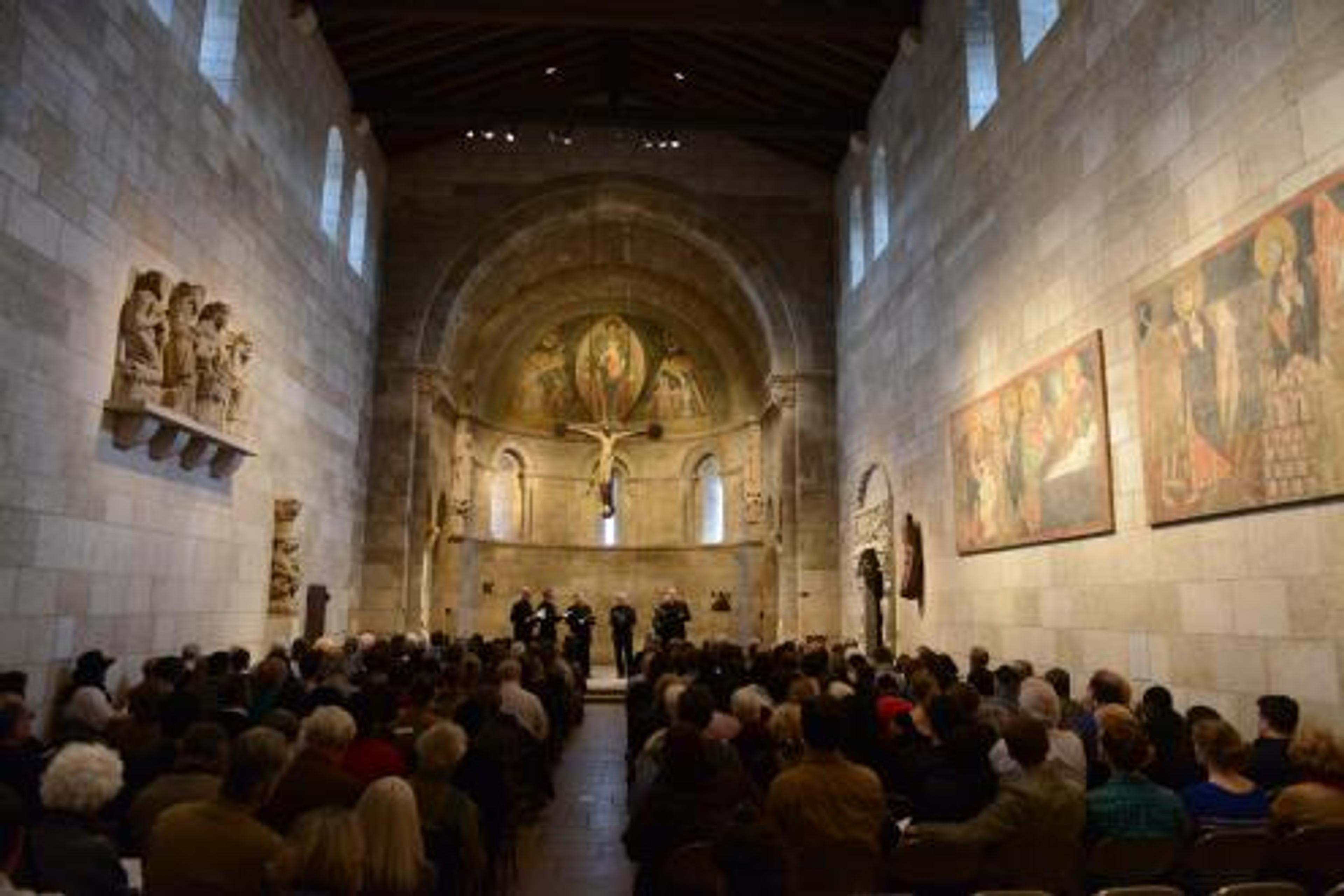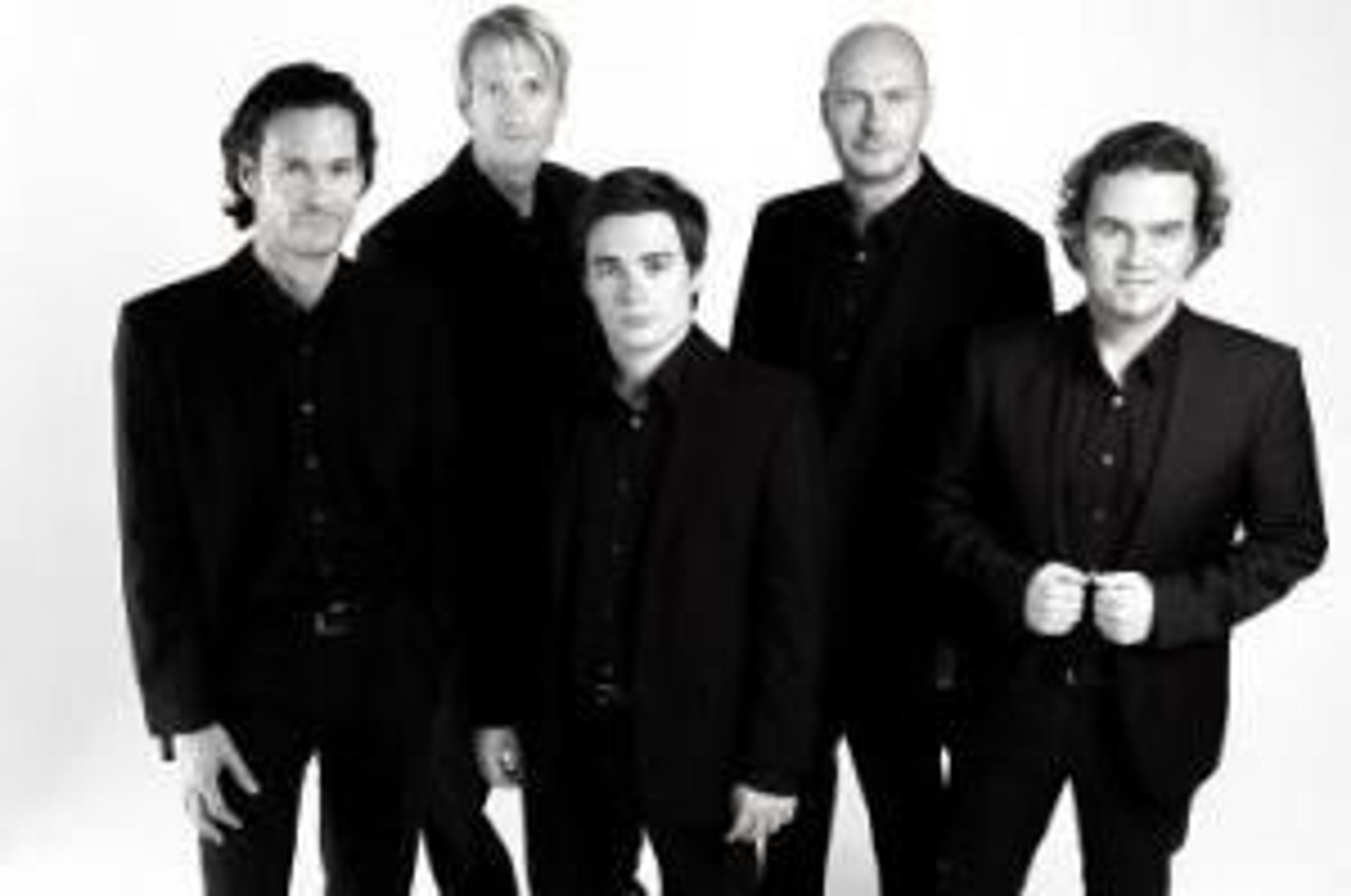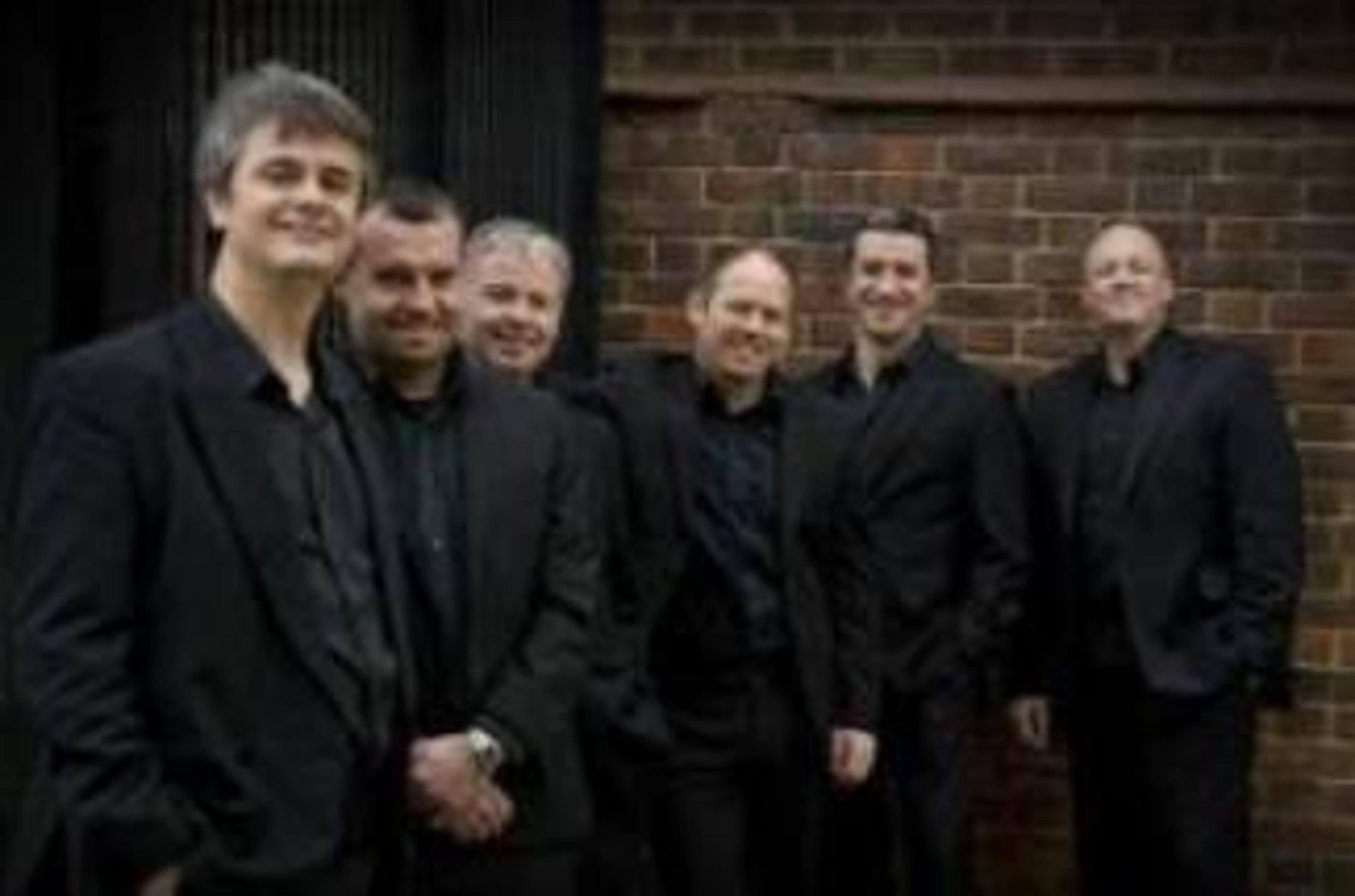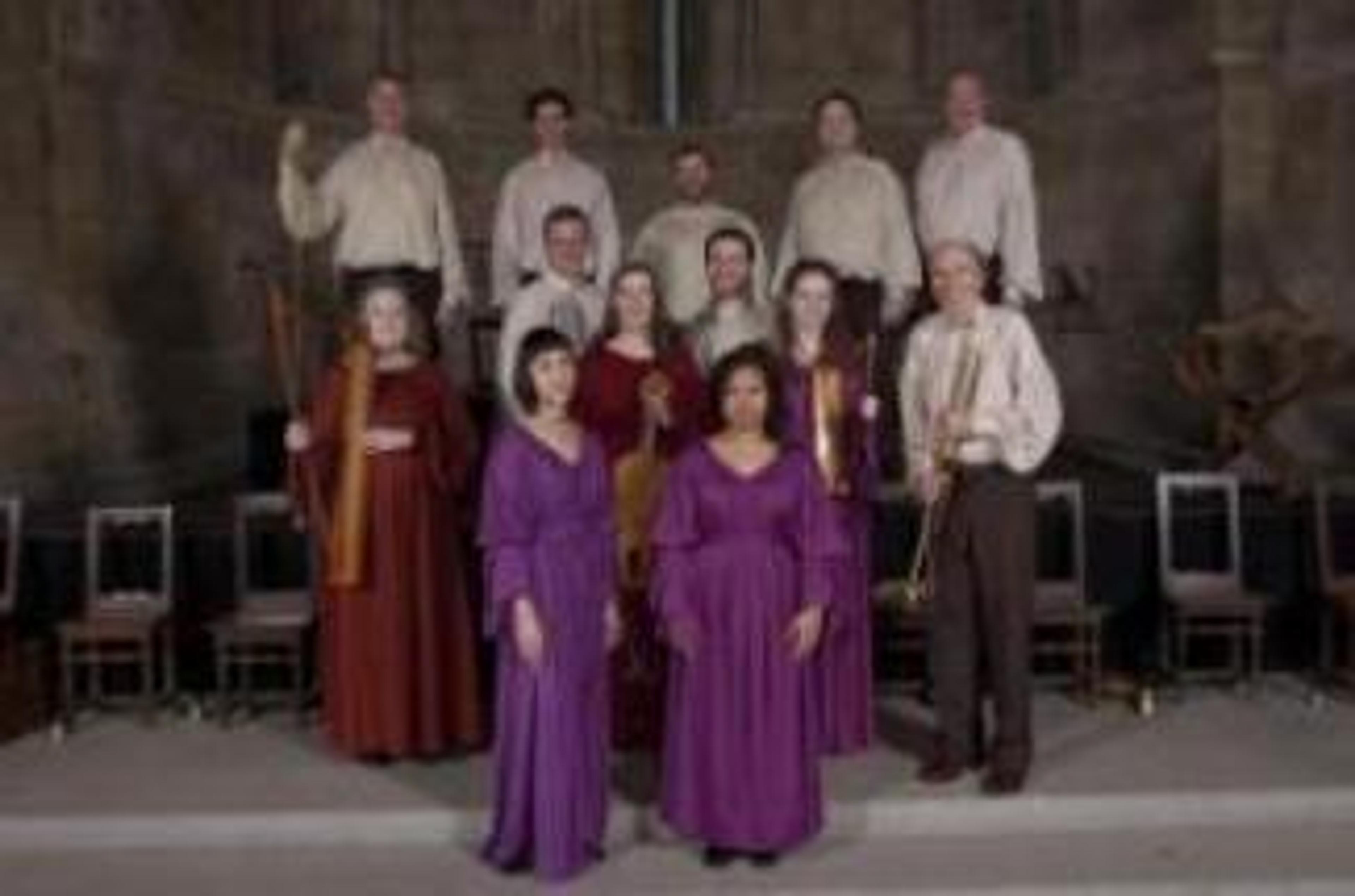
For more than 50 years, the pioneering early music series Concerts at The Cloisters has provided New York music lovers with unique and unforgettable access to the vocal and instrumental music of the Middle Ages and the Renaissance. The superb acoustics of The Cloisters’ performance space—the historic 12th-century apse from the church of San Martín from Fuentidueña, near Segovia, Spain—enhance every performance. The 2015–2016 season features an outstanding roster of local and international ensembles—including many that are new to The Cloisters.
Sunday, November 15, 1:00 P.M. and 3:00 P.M., $40amarcord Orlande de Lassus—Requiem (Missa pro defunctis à 5)

One of the best-known and most prolific composers of his time, Orlande de Lassus (1532–1594) is credited with around 2,000 works, including more than 60 polyphonic masses. Each part of the “Requiem for five voices” (1589) opens with a plainchant melody in the bass voice. Additional movements appropriate for a requiem mass setting from the same period complete the program.
amarcord, one of today’s leading vocal ensembles, was founded in 1992 by former members of Leipzig’s illustrious Saint Thomas Boys’ Choir. The group’s impeccable technique and musical sensitivity have won them prestigious competitions and awards, including the first Choirlympiad in Linz (Austria), the German Music Competition for Chamber Music in Bonn (2002), and the Early Music category of the International Classical Music Award (2013).
“There is no doubting the singers’ pedigree—diction, ensemble and intonation are all impeccable.” (BBC Music Magazine)
Saturday, November 21, 1:00 P.M. and 3:00 P.M., $40The Binchois Consort Henry V and Lancaster

To mark the 600th anniversary of the Battle of Agincourt—a major battle during the Hundred Years’ War between the English and the French and the subject of Shakespeare’s Henry V—the UK-based Binchois Consort presents a program of Agincourt carols, motets, and chants, celebrating Henry V as a formidable military and political figure, as, in turn, Henry’s piety is revealed in his own settings of the Mass and the chants for John of Bridlington, the last Englishman to be canonized before the Reformation.
The Binchois Consort (Andrew Kirkman, founder and director) travels extensively throughout Europe and the United States. Its recordings have won numerous music industry awards, including “Recording of the Month” and “Early Music Disc of the Year” in Gramophone magazine, “Diaposon d’Or,” France, and “five stars” in BBC Music Magazine.
“…This repertoire testifies to the haunting purity of music from the early 15th century…. The Binchois Consort under Andrew Kirkman performs with discreet, moving expressiveness.” (The Telegraph)
Saturday and Sunday, December 12 and 13, 1:00 P.M. and 3:00 P.M., $45The Waverly Consort The Christmas Story

Every holiday season, the Waverly Consort’s 13-member ensemble performs The Christmas Story on tour. This program—beloved since its premiere at The Metropolitan Museum of Art in 1980—includes vocal and instrumental hymns, processionals, antiphons, and Mass compositions from the 10th to the 15th century, arranged as a narrative. Rooted in music manuscripts and illuminated miniatures of the Middle Ages, these selections evoke the liturgical calendar for Advent and Christmastide.
Founded to explore the sounds and styles of early musical repertories, The Waverly Consort (Michael Jaffee, director) has created a worldwide audience through extensive tours to South America, Europe, and the Far East. Founders Michael and Kay Jaffee have been recognized for their contribution to early music performances by the National Music Council, the Music Educators National Conference, Chamber Music America, Early Music America, Gotham Early Music Scene, and New York University.
Sunday, December 20, 1:00 P.M. and 3:00 P.M., $45Lionheart Veni Emmanuel: Chant and Polyphony for Advent and Christmas The seven “O” Antiphons for the Magnificat at Vespers on the days leading up to Christmas—familiar from the verses of the hymn “O Come, O Come Emmanuel”—are heard here in their original Gregorian melody; in organum (medieval improvised polyphony); woven into a five-part setting by Lionheart member Richard Porterfield; and in settings by Arvo Pärt augmented by two Renaissance settings of the Magnificat. Along with polyphonic motets by Morales, Francisco Guerrero, and Tomás Luis de Victoria, these works lead the listener from the penitent expectation of Advent to the joyful fulfillment of Christmas.
Reprising the program it premiered at The Cloisters in 2014, Lionheart—a six-man a cappella ensemble—is best known for its interpretation of medieval and Renaissance vocal music. Noted for its “sublime tonal quality” and “flawless voices” (Early Music America), with “fine gradations of texture and dynamics [that give] the music an unusual clarity and depth” (New York Times), Lionheart performs regularly at major early music venues in the United States and Europe.
Sunday, February 21, 1:00 P.M. and 3:00 P.M., $40Pomerium Musical Games, Puzzles, and Riddles of the RenaissanceCourtly society in the late Middle Ages and early Renaissance prized games, puzzles, and riddles. Composers found ways to participate in this culture by writing music that manipulated the rules of notation, sometimes taking a cue from verbal puns. Pomerium presents works from the Renaissance that exhibit compositional gamesmanship in structure or notated appearance. Works include Baude Cordier’s picture songs from about 1410, Antoine Busnoys’s Pythagorean motet of 1464 honoring Johannes Ockeghem and the slightly later bell motet honoring St. Anthony, Henricus Isaac’s “Silver and Gold” Mass (ca. 1500), and Josquin Desprez’s Mass of the Dice from the 1480s. The program concludes with the six-voice Agnus Dei from Josquin’s Missa Malheur me bat of around 1505, a tour de force of musical canons.
This program complements the exhibition The World in Play: Luxury Cards, 1430-1540, on view at The Cloisters from January 20 through April 17, 2016.
Sunday, March 6, 1:00 P.M. and 3:00 P.M., $40Galileo’s Daughters and The Cat’s Paw CARMINA! Vocal and Instrumental Song at the Dawn of the RenaissanceJust as medieval and Renaissance nobility whiled away their leisure by playing cards and other games, musicians of the time enjoyed toying with musical composition and improvisation. As written instrumental music evolved from a predominantly oral tradition, musicians sometimes copied and played with the musical design of part-songs, thus creating clever songs without words (carmina). This program features works from the turn of the 16th century, including the music of Josquin, Ockeghem, and Tromboncino, and the Glogauer Liederbuch. With Sarah Pillow (soprano), Ronn McFarlane (lute), Mary Anne Ballard, John Mark Rozendaal, and James Waldo (viols).
This program complements the exhibition The World in Play: Luxury Cards, 1430-1540, on view at The Cloisters from January 20 through April 17, 2016.
Saturday, March 19, 1:00 P.M. and 3:00 P.M., $40Pomerium Passion and Resurrection Motets of the RenaissancePomerium performs its exploration of the great Renaissance choral music of Passiontide and Easter. The program focuses on the period between Palm Sunday and Easter Day with an emphasis on music for Holy Thursday and Good Friday. Progressing from the austerity of Gregorian chant and its polyphonic elaborations by Du Fay and Senfl, to the intense Lamentations by Robert White and affective evocations of the events of Holy Week by Monteverdi and Gesualdo, the program culminates in the celebration of the Resurrection in glorious motets by Orlande de Lassus and William Byrd.
Founded by Alexander Blachly in New York in 1972 to perform music composed for the chapel choirs of the Renaissance, Pomerium takes its name—“garden” or “orchard” in medieval Latin—from a treatise by the 14th-century music theorist Marchetto da Padova. (He explained that his book contained the “fruits and flowers” of the art of music.) Widely known for its interpretations of Du Fay, Ockeghem, Josquin, Palestrina, and Lassus, Pomerium celebrated its 40th anniversary with the release of the CD A Voice in the Wilderness—Mannerist Motets of the Renaissance, recorded in the Fuentidueña Chapel at The Cloisters.
“…the 13-voice Pomerium at its polished and beautifully blended best…” (The New York Times)
Saturday, March 26, free with Museum admissionKlang by Karlheinz Stockhausen (U.S. Premiere) Karlheinz Stockhausen’s fiercely original Klang (meaning “sound” in German) is an acoustic and electronic work so massive that it requires all day and all three of the Met’s iconic buildings to stage. This 21-part, unfinished composition was originally envisioned by Stockhausen as consisting of 24 individual compositions (one for each hour of the day), but the work was unfinished at the time of his death. This performance—which marks the U.S. premiere of Klang in its entirety—will be performed at the Metropolitan Museum’s Fifth Avenue building, The Met Breuer, and The Cloisters. For up-to-date information on performance times, and for additional details, visit http://www.metmuseum.org/visit/the-met-breuer/performance.
This program is made possible by the Stavros Niarchos Foundation and the Samuel White Patterson Lecture Fund.
Sunday, April 17, 1:00 P.M. and 3:00 P.M., $40The Baltimore Consort The Food of Love: Songs, Dances, and Fancies for ShakespeareThis “rambunctious sextet” (Washington Post) presents the New York premiere of a new program featuring their core repertory—music of the Elizabethan era—along with songs and consort music from Shakespeare’s plays. The ethereal soprano Danielle Svonavec performs some of the greatest music from the Bard’s songbook, including “It Was a Lover and his Lass” (As You Like It), “Where the Bee Sucks” (The Tempest), “King of Denmark’s Galliard” (Hamlet), and “The Willow Song” (Othello). The group’s instrumentalists play Renaissance arrangements of dances and consort music related to the plays on lute, cittern, viols, and flute.
The Baltimore Consort was founded in 1980 to perform the instrumental music of Shakespeare’s time. The ensemble has explored English, Scottish, and French popular music of the 16th to the 18th century, focusing on the relationship between folk and art music. The group’s interest in early English-Scottish music has led them to delve into the rich trove of traditional song and dance preserved in North America.
“...superb musicianship...achieved with the ease, fluidity and flawless skill long taken for granted for string quartets and other ‘modern’ chamber ensembles.” (Houston Chronicle)
* * *
The Cloisters museum and gardens—the branch of The Metropolitan Museum of Art devoted to the art and architecture of medieval Europe—is located in Fort Tryon Park in northern Manhattan with a spectacular view overlooking the Hudson. The Cloisters collection includes sculpture, illuminated manuscripts, metalwork, and stained glass housed in a building designed to evoke the period in which these splendid objects were produced.
Concert tickets include same-day admission to the Museum. All tickets are for general seating. To purchase tickets, or for further information, call (212) 570-3949 or visit our website at www.metmuseum.org/cloisters.
Information available on the live arts series of performances and talks in the Museum’s main building on Fifth Avenue and 82nd Street at www.metmuseum.org/tickets.
How to Reach The CloistersSubway: A train to 190th Street, exit by elevator and walk through the park or transfer to M4 bus (Fort Tryon Park—The Cloisters). Bus:M4 Madison Avenue (Fort Tryon Park—The Cloisters) to last stop. Car: Henry Hudson Parkway north to first exit after George Washington Bridge. Free parking available.
Visitor Information (212) 923-3700
Educational programs
(212) 650-2280
Concerts at The Cloisters general information
(212) 650-2290
###
October 5, 2015
Image 1: Lionheart in concert at The Cloisters. Photo: The Metropolitan Museum of Art/Don Pollard; Image 2: Photo by Martin Jehnichen; Image 3: Photo courtesy of The Binchois Consort; Image 4: Photo courtesy of The Waverly Consort